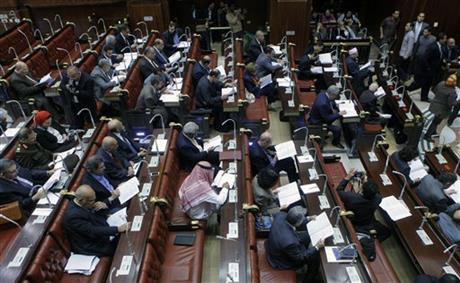
Members of Egypt’s panel tasked with amending Egypt’s Islamist-drafted constitution, read drafts of the constitution before they begin voting on a series of amendments, in the Shoura Council, Cairo, Egypt, Saturday, Nov. 30, 2013. The 50-member committee will hand in the draft constitution to interim Egyptian President Adly Mansour, who has a month to call for a public vote on it. (AP Photo/Amr Nabil)
CAIRO (AP) — Egypt’s draft constitution is made up of a four-page preamble and 247 articles. On Saturday, the country’s 50-member constituent assembly voted on 138 articles, limiting the scope of Islamic law, or Shariah, in legislation and introducing new articles seen as victory to rights advocates.
The draft is a milestone in the path toward democratic rule after the stunning ouster of Egypt’s elected Islamist president in a July military coup and the suspension of a previous constitution passed under his watch.
Here’s a look at some of the key points adopted in the draft, which later faces a referendum:
“Civilian” government:
In the preamble, the draft states: “we, now, are writing a constitution that continues to build a democratic, modern country with a civilian government.” The word “civilian” in Arabic indicates non-religious and non-military. The term had stirred anger among ultraconservative Islamists who consider it synonymous with “secularist.”
Islamic Shariah law:
The draft also says in the preamble that “we are writing a constitution which ensures that the principles of Islamic Shariah are the main source of legislation.” It referred to rulings of the Supreme Constitutional Court to define these principles.
The phrasing reverses previous language added by Islamists that opened the door to wider interpretation of laws in line with religious jurisprudence. Both critics and ultraconservative supporters of the charter said it had allowed stricter imposition of Islamic law.
The panel also removed another article that gave Islamic clerics unprecedented powers. It had said that senior scholars of Egypt’s Al-Azhar, the most respected center of scholarship and rulings in Sunni Islam, were “to be consulted in matters pertaining to Islamic law.”
Freedom of belief:
The draft says freedom of belief is “absolute.” In last year’s constitution, freedom of belief was “preserved.”
Political parties:
The draft prohibits political activity or the establishment of political parties based on religion, dealing a blow to movements like the Muslim Brotherhood, its Freedom and Justice party, and Al-Nour, an ultraconservative Salafi party.
Torture:
The draft banned torture “in all its forms and manifestations” and considered it as “a crime with no statute of limitations.”
Discrimination:
Citizens are equal before the law; they are equal in rights, freedoms and public duties, without discrimination on the basis of religion, belief, gender, origin, race, color, language, disability, social status, political affiliation, geographical location or any other reason. Discrimination and inciting hatred is a crime punishable by law. The state is obliged to take necessary measures to eliminate all forms of discrimination, and the law regulates the establishment of an independent commission for this purpose.
Slavery:
The draft prohibits and criminalizes “any forms of forced slavery, servitude, oppression, exploitation of human beings, sex trafficking and other forms of human trafficking.”
International agreements:
The draft says the state is bound to all international agreements, including human rights covenants, already signed by Egypt.


